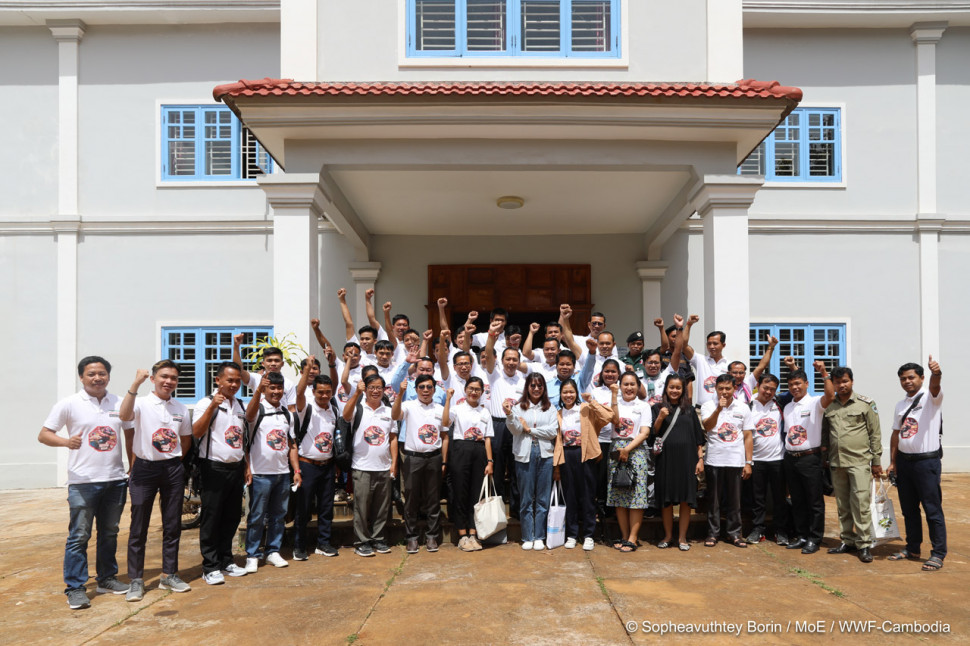The need for eating wildlife is a major chaos factor that promotes shooting, trap crisis and illegal wildlife trade It is also a factor that increases the risk of transmission from animals to humans, which also poses a significant threat to the environment and public health.
The Law Enforcement Report of the Mobile Law Enforcement Group in Sierra Leone showed that in the last 18 months, as of 2021, a total of 1 wildlife meat, 353 kilograms were ransacked while the meat was traffic in the traffic market. At the same time, law enforcement in the province A total of more than 200 kilograms of wildlife has sequenced a total of more than 200 kilograms of wildlife when collapsed along the market in the last six months.
"You eat wild animal meat to deceive," said Admiral Ned Praga, Secretary of State for Environment and spokesman for the Environment Ministry. Health pancreas or for treatment of a variety of diseases as well as for strength or for self-esteem Instead, eating wild meat not only poses a risk to the health of your eater Unfortunately, it also encourages shooting, trap and trade in wildlife globally."
Seng Tik, president of Cambodia's WWF organization, stated: "Global valuable wildlife such as tigers and wildlife have already been extinct due to traps, shooting and stamping The illegal trade in which these activities are continuing to kill wildlife regularly, causing the number of other wildlife in the nature reserves to decline dramatically."
Wildlife victims of wildlife demand and illegal trade include fox species Footwear, such as wildlife, wildlife, and peanut butter, as well as mattresses, sailors, and so on. A wheat study by the Cambodian Ministry of Environment and WWF showed that between 2010 and 2022 Wildlife species in the eastern territory of Cambodia have decreased dramatically Noteworthy. Of which the expenses decrease by 89% of the birds decreased by 65% and wild pigs decreased 15%. The same study also showed that the presence of scorpions and used in forest areas was low.
Eating and trafficking in wildlife are also opportunities for direct impact between humans and wildlife, querying through activities Trade in markets and restaurants as an opportunity to increase the risk of transmission from animals to humans. Not only posed a significant risk to human health, but it also raised the chance of transmission from animals to humans All stages of this wildlife trafficking chain: illegal shooting, transportation, preservation, recycling, trafficking And the sale of wildlife.
Most wildlife eaters do not understand the risks they face and the consequences to families, communities and society According to an estimated among the most recent types of infections that are similar to or more dangerous conditions than tuberculosis In fact, outbreaks of infectious diseases, like road diseases SARS respiratory disease MERS, Swine Flu H1N1, H5N1 bird flu, etc. All species of animal-to-human infected diseases.
The campaign to halt the wildlife trade, officially opened today by the Ministry of Environment, the Ministry of Environment, the Sierra Leone Province, the WWF and the Marketing Ministry Otherwise aims to stop eating and trafficking in wildlife and call on all citisers to commit not to eat wildlife by visiting the website: https://zerowildmeat.org/kh/\
Campaign to Stop Wildlife Trade as part of the Large Campaign: A "Net 3 Trap Campaign" designed to change improper attitudes and attitudes People involve eating wildlife and returning to conservation of Cambodian wildlife and protecting public health from future infections.
"This is an important time you like the environment, adds Admiral Ned Praka, secretary of state. Food and trade all wildlife to make positive changes to stop eating or trading Wildlife corals and turn two activities into the protection of wildlife and natural resources for contributing to the development of Caesar Tasks and natural tourism and benefit the protection of ecological systems both in Cambodia and in the universe.
Preventing and stopping the trade and eating wildlife is all our obligation. While strengthening law enforcement, the Ministry of the Environment and partners have also been the focus On local economic development to increase income, create busily, provide new options for citiatives to reduce pressure on natural resources. The involvement of all walks of life is essential to achieving shared goals: the preservation of wildlife in the natural forest for economic benefit Natural tourism while continuing to contribute to the strength of ecological systems and conservation of biodiversity resources in nature reserves."
The wildlife trade campaign will be implemented in the first phase of six weeks in October and November 2012. Four 32 locations in Sierra Leone to encourage commitments to stop the sale of wildlife meat and continue to spread the battle widely.












0 Comments